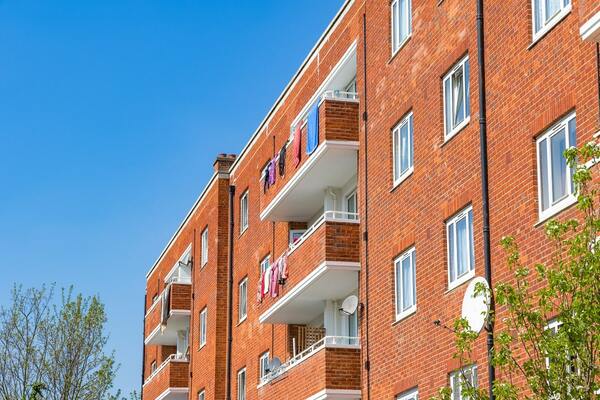You are viewing 1 of your 1 free articles

Brendan is the founding Chair of Sustainability for Housing. He has more than 20 years’ experience as a CEO in the social housing sector,...more
Social security cuts and a poorly paid gig economy have created a trap without an escape route
We must recognise social housing as a springboard to success in 2021 and work towards a strategy that helps get people back on their feet, argues Brendan Sarsfield
Health, wealth and well-being took a battering in 2020. The pandemic continues to be tough, and in many ways has accelerated trends that were already taking place.
In June, the Social Mobility Commission, the government’s own advisory board, said that 600,000 more children are now living in relative poverty than in 2012 and that this is projected to increase due to benefit changes and COVID-19.
In November, its research showed that one in five men (21%) and one in four women (24%) aged 30 to 59 experienced downward mobility between 2014 and 2018 in the UK.
On housing, the commission said that “successive governments have introduced initiatives to help first-time buyers, but few of these help those on low incomes or boost social mobility. Social housing reforms could improve prospects for tenants, yet there is simply not enough social housing and tenancies are too short to give stability or security”.
The sector has made the moral, social and economic case for increased public investment in social housing. They are compelling arguments and have at least gone some way to protecting the Affordable Homes Programme.
But the fact is that the construction of new social rented homes has significantly reduced over the past decade, contributing to the steep rise in homelessness and people living in temporary accommodation.
Ideology is at the heart of this. Government has heard our voice but fundamentally believes that everyone aspires to homeownership and that housing policies should be directed toward that end. The problem is that their wider social policy agenda works in the opposite direction, excluding the majority of people from the benefits.
The past decade’s cuts to the social security safety net, and the emergence of a widespread gig economy with poor pay, have created a trap without an escape route.
“Systemic inequality removes opportunity and frustrates the meritocracy that I would like to see flourish”
Through a reluctance to invest in early years and affordable childcare, the lack of support for disadvantaged students, relative inaction on low wages, and through the expansion of the private rented sector, inequality has increased and, for many people, progress on social mobility has reversed. People have been driven further away from the goal of homeownership than ever before.
At a recent event a Conservative MP made the well-observed point that talent is evenly distributed throughout the population, but opportunity is not. We see that talent every day in our communities.
The discussion, which was in the context of a debate about caring conservatism, noted that the left often talk about inequality and fairness, while people on the right talk about individual freedom, action, and the opportunity to progress if you work hard.
For me, these are two sides of the same coin. Systemic inequality removes opportunity and frustrates the meritocracy that I would like to see flourish.
Local government, charities, housing associations and others have stepped in to try and help people unlock opportunity in their lives. At Peabody, we’ve provided more than 17,600 free books to families with children under five since 2012.
Our Children’s Community partnership with Hackney Council and Save the Children is helping to make tangible improvements for people. We’re developing new partnerships and we have co-designed ways of delivering affordable childcare. We help people into work, run business and enterprise forums, have dedicated youth teams, and create jobs, apprenticeships and other social value. We invested £8.5m last year alone in programmes to empower people in our communities.
We are not alone. Housing associations across the sector do absolutely fantastic work for their residents and in their wider communities. Social housing is one of the strongest possible foundations for spreading opportunity.
Unfortunately, now more than ever, there will be record numbers of people who will need support. They will be further away than ever from success, aspiration or opportunity. This was recognised by a group of senior Conservatives in advance of the Spending Review who urged the government to put social housing at the heart of the recovery in a letter to The Telegraph.
“Post-pandemic, there can be new opportunities to do things differently. To not make the same policy mistakes we’ve seen throughout the past decade”
I agree with them. Now is the time for a change in approach by government. I hope the voice of those backbenchers, and the evidence of the Social Mobility Commission, will be heard and acted on. Post-pandemic, there can be new opportunities to do things differently. To not make the same policy mistakes we’ve seen throughout the past decade.
As a country let’s look again at social mobility and work towards a strategy where policy can get people back on their feet; help them help their families learn, grow and succeed; and provide the foundation to achieve their goals.
Recognise social housing as a springboard to opportunity and success. Work with us as partners to invest in our people and communities. Bring forward policies that bring social mobility back to the top of the agenda. Then we can get through these terrible times and help people towards a better future.
Brendan Sarsfield, chief executive, Peabody
Sign up for our Week in Housing newsletter
Already have an account? Click here to manage your newsletters












